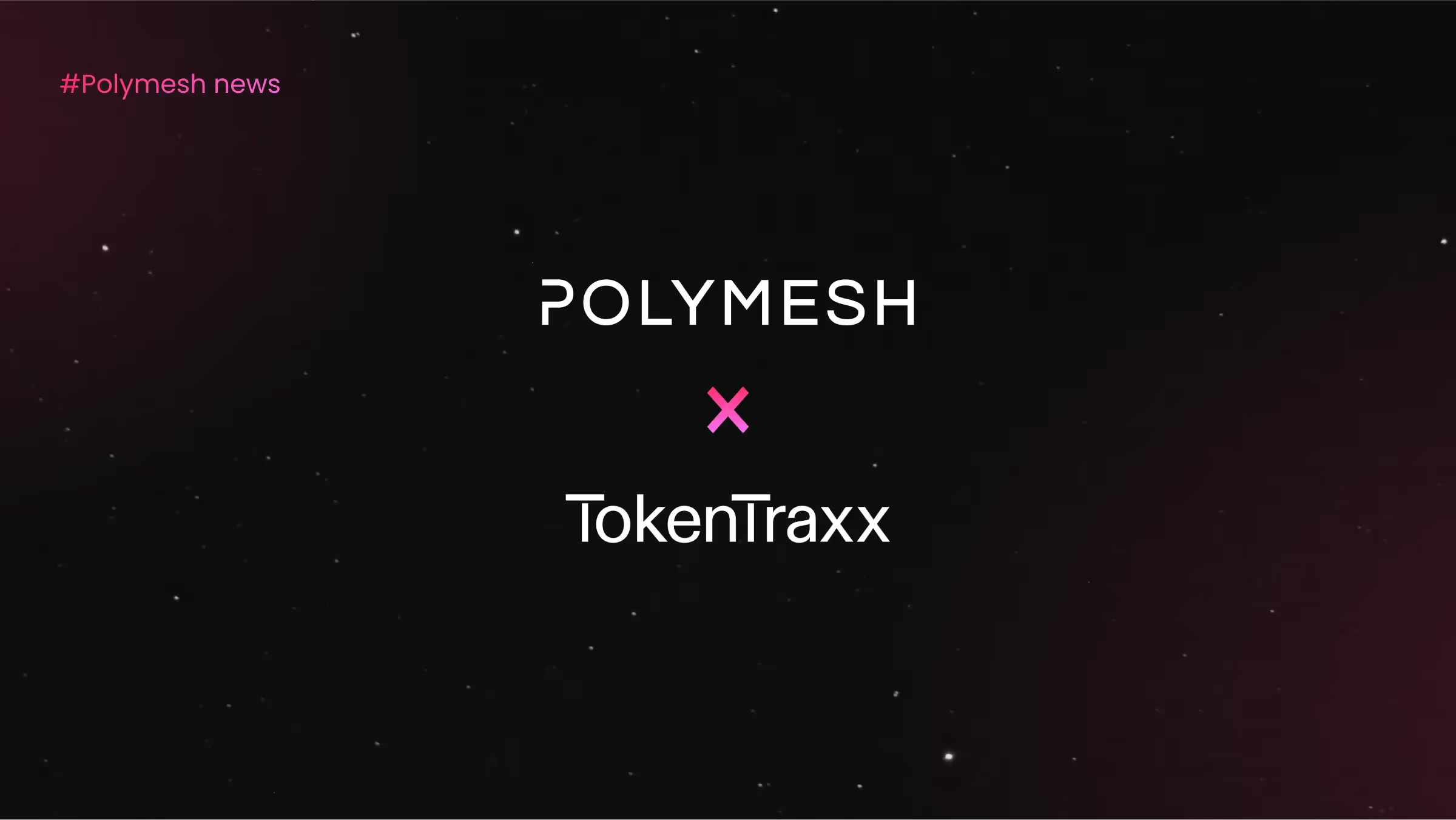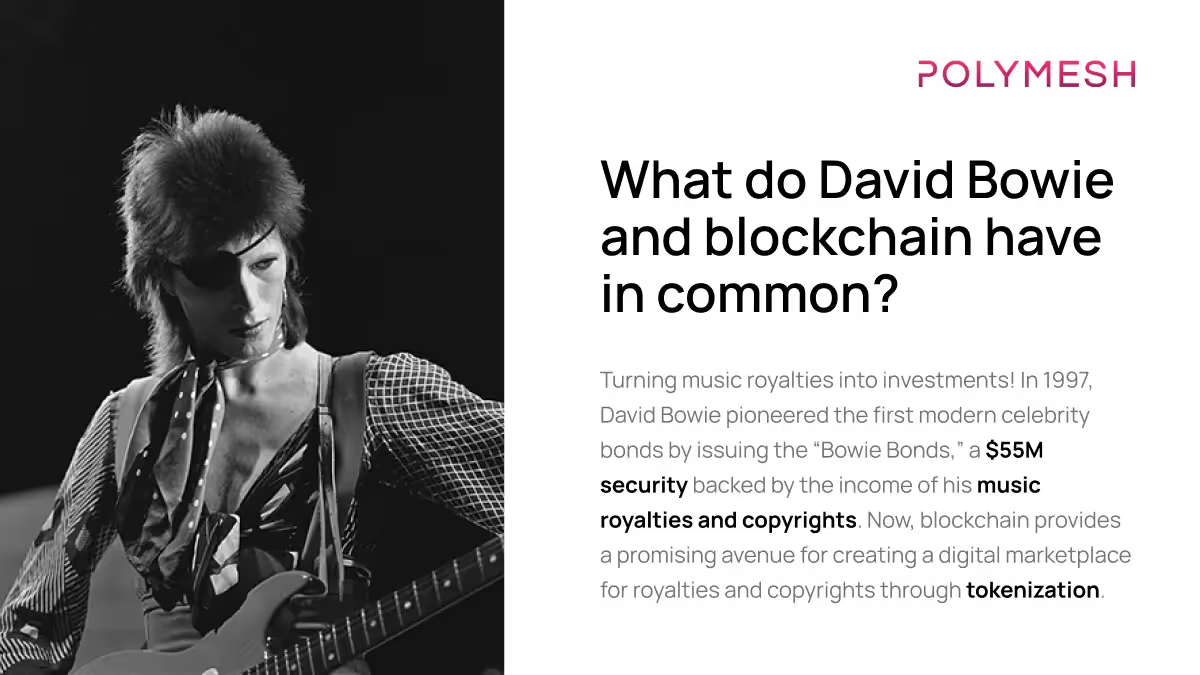From ideas to tokens: exploring tokenized intellectual property
Real world assets or RWAs could grow to a market reaching $5-16 trillion by 2030. Some asset classes had their value boost 400%+ in 2023 due to increased demand for tokenization.
One RWA keeping the industry on its toes is tokenized intellectual property (IP), where the emerging world of digital assets intersects with traditional concepts in IP such as ideas, patents, trademarks, and copyrights.
In this blog post, we’ll look at how blockchain is evolving traditional forms of intellectual property with tokenization and the implications this has for IP holders, innovators, and investors. We’ll also touch on the regulatory and security concerns, potential benefits for liquidity and access, and the key industries to be impacted.
Tokenizing intellectual property on the blockchain
What is intellectual property?
Intellectual property is considered an intangible asset since it’s neither physical nor financial. Tangible assets such as real estate, gold, or oil have physical forms with objective market value that provide value to their owners. Financial assets such as stocks, bonds, and mortgage agreements – while non-physical – are considered tangible since they have paper embodiments and represent claims on corporate assets that can take tangible form.
Intellectual property has neither a physical embodiment nor a claim to an asset with form. Instead intellectual property is the product of human intellect, embodied in products/services, literary and artistic works, designs, symbols, and inventions. Patents, copyrights, trademarks, and trade secrets (including names, logos, symbols, inventions, client lists, recipes, and more) are all considered IP.
Common forms of intellectual property might have tangible or physical components. For example, music may be embodied by a digital asset file, or a patent might represent a tangible product such as a drug, computer, or machine. However, it’s the intangible knowledge and creativity in these products that intellectual property is protecting and claiming rights to.
Owing to its non-physical existence, it’s difficult to calculate the value of intellectual property assets. The realm of IP tokenization has been largely unexplored until now.
How can intellectual property be tokenized?
Intellectual property can be tokenized just like any other RWA. Traditional forms of IP such as copyrights, trademarks, and patents can be converted or represented digitally onchain as tokens.
Tokenization converts the rights to an asset into a digital token on the blockchain. Tokens represent various forms of ownership and can be transacted, traded, and utilized just like physical assets.
Trading or licensing tokenized IP can allow for new forms of monetization and improve the sharing of valuable ideas and creations, from patented biopharmaceuticals to music royalties. Since blockchain technology is global, participants across the world can participate in the market for ideas and inventions, bringing new possibilities to industries that thrive on innovation.
How does traditional IP translate to tokens?
Blockchains like Polymesh provide the base-layer infrastructure to issue non-fungible tokens (NFTs) that preserve the inherent uniqueness of intellectual property assets.
What exactly is tokenized will depend on the nature of the asset. As an example, let’s consider tokenized music (a notable real-world example on Polymesh is TokenTraxx!).
Artists can tokenize their songs as NFTs to represent ownership of their inherently unique creations.
Should an artist wish to tokenize music royalties (perhaps as a way to raise funds for the production of a new album), they may use NFTs to create a tokenized contract instead.
Both of these tokenized music assets could legally be considered intellectual property.
What role do smart contracts play in the management and trade of tokenized IP?
Smart contracts can be used to automate IP management, but they’re not required on Polymesh!
Native functionality on Polymesh streamlines the management of tokenized IP assets without requiring smart contracts, which can be complex and timely to implement. Polymesh’s built-in compliance and settlement functionality enables the automatic execution of IP transactions, such as royalties or licensing agreements, once predefined conditions are met.
Smart contract functionality is possible on Polymesh to enhance functionality across use cases. For example, smart contracts can be leveraged for decentralized governance to allow for community-driven management of IP assets, giving a voice to creators and users alike.
What are the benefits of tokenizing intellectual property?
For IP holders, tokenization offers a unique opportunity to enhance the value of their assets.
By fractionalizing IP into tokens, asset owners can sell or license smaller pieces of their IP, attracting a broader market to their ideas and inventions. For example, a startup could fractionalize the rights to its software and sell some of the tokens as a way to fund future development. Or a patent owner may wish to tokenize their patent to provide liquidity and expose their invention to a global audience while retaining a majority share of ownership.
Tokenization also brings transparency and traceability to IP transactions and sharing, which helps enforce IP rights while adding a layer of security against fraudulent claims or unauthorized use. IP theft – intentional and accidental – plagues intellectual property and can cause as much damage as physical property theft. Hundreds of billions of dollars are estimated to be lost every year as a result of IP infringement.
The immutable ledger can also serve as a tool for resolving IP disputes by providing an immutable and verifiable record of transactions and ownership.
Industries primed for IP tokenization
Blockchain is well-positioned to leverage IP tokenization in many industries, including…
Pharmaceuticals and biotechnology
Pharmaceuticals and biotechnology are two Industries with high-value intellectual property due to the potential for significant financial gain and innovation in their product offerings.
Pharmaceutical companies can tokenize their patents to attract new funding sources and facilitate IP sharing in research consortia. IP-NFTs can also be used in the decentralization of research, reducing the need for patenting or launching startups while supporting a community-driven, inclusive approach to research.
Technology
Technology more broadly is another prime candidate for IP tokenization. As with biotechnology, other fields of technology stand to benefit immensely from the funding opportunities and data marketplace that tokenization facilitates.
Companies can tokenize IP for software, including source codes and algorithms, to ensure they can be effectively protected and managed in a digital marketplace. Tokenizing IP can also let small-scale developers acquire resources for the development, improvement, and marketing of their products, enabling them to raise funds and compete with bigger companies. Since increased competition leads to increased innovation, industries from gaming to AI have a lot to gain.
Culture
The explosion of NFTs has already seen artists and content creators tokenize their work, changing the concept of digital ownership and monetization in the creative space.
A lesser-known but related sector that IP tokenization can impact is culture. Tokenizing IP from cultural archives and public domain works can preserve and protect valuable collective knowledge while opening new avenues for scholarly research and creative endeavors.
Concerns and challenges for tokenized intellectual property
Transforming ideas into digital tokens is a technical challenge that requires robust security measures across token creation, issuance, and management.
It’s also a legal challenge, as the regulatory frameworks for digital assets are only in their infancy. Tokenized IP raises many questions for governing bodies and legal professionals that have yet to be answered.
Potential security concerns for tokenized IP holders
As with other tokenized assets (and digital data in general), maintaining data privacy is essential to prevent unauthorized access, replication, or theft of sensitive information in tokenized IP.
The digital nature of tokenized IP assets makes them susceptible to cybersecurity risks. Token holders should exert caution and protect their accounts just as they would with other crypto assets. You wouldn’t want to lose your private key and with it your ownership to an IP token.
On the technology front, platforms and service providers need to safeguard against hacks, breaches, and data tampering as they would with any other offering. There should also be some kind of freeze, burn, and re-minting mechanism should the loss of a private key or IP theft occur.
Ultimately, mitigating potential security concerns comes down to following cybersecurity best practices and ensuring security protocols are in place. It’s unlikely that just holding an NFT will be enough to legally claim and validate ownership rights in the eyes of regulators, especially in the event of the loss of a private key. Tokenized IP holders and platforms should be prepared to adjust their criteria as regulation evolves.
Navigating legal and regulatory frameworks
Navigating traditional IP rights to tokenized forms requires navigating a complex web of international intellectual property laws and compliance with evolving digital asset regulations.
IP law has yet to catch up with the rapidly evolving tokenization landscape, creating uncertainty and challenges in tokenizing intellectual property.
Instances of works being tokenized without creators’ consent have led to questions about the rightful ownership of NFTs, their legal connection to represented creations, and whether creators minting NFTs can be considered an infringement of their own copyrights.
The legal community is currently engaging in talks about the future of IP laws amid tokenization. As with other crypto assets, we can expect updates to existing legal frameworks and the introduction of new ones that balance innovation with protection for tokenized IP. However, it’s likely many legal considerations will only come to view once issues have already occurred.
The future is tokenized: charting the course for the IP economy
IP tokenization introduces a radical new way of valuing, protecting, and transacting knowledge and creativity. In the new IP economy, digital assets will play an increasingly critical role in creating, protecting, and sharing our most valuable thoughts, expressions, products, and agreements.
The future of tokenized IP lies in continuous innovation and collaborative partnerships bridging technology, law, and business. How it unfolds will unlock new possibilities for creators and society at large.
For creators, investors, and stakeholders in the IP space, the time is now to prepare for the shift towards tokenization.
Engaging with the blockchain ecosystems and understanding the tools and technologies at hand – such as Polymesh, and its functionality for NFTs – is the first step in navigating the intellectual property landscape of the future.
Transform intellectual property by representing assets onchain. Tokenize on Polymesh and unlock better efficiency, transparency, and liquidity of IP assets.









































